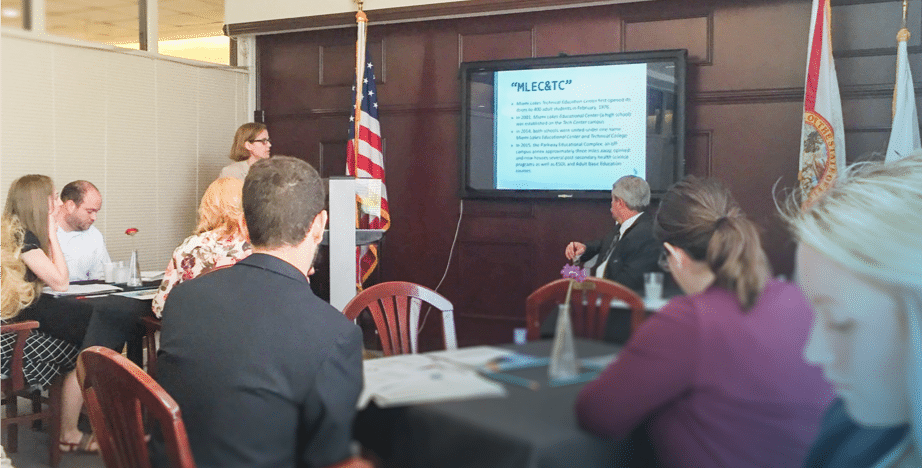OVERVIEW
This forum examined strategies to improve the achievement, language proficiency, and graduation rates of adolescent English Language Learners (ELLs). The New York City Department of Education has prioritized improvements to the system-wide infrastructure for ELL education as a critical component of the district’s overall school reform strategy. As part of the portfolio of options provided for the district’s 150,000 ELLs, the Internationals Network for Public Schools provides rigorous instruction for recently arrived immigrant youth through its small high schools that have been nationally recognized for their strong results. With an eye to ESEA reauthorization, the forum explored lessons learned from these efforts that can be applied to federal policy. Presenters included Deborah Short, Division Director, English Language & Multicultural Education Division; Center for Applied Linguistics, (DC); Laura Rodriguez Deputy Chancellor, Division for Students with Disabilities and English Language Learners (NY); and Claire Sylvan, Executive Director, Internationals Network for Public Schools (NY).
PRESENTERS:
 Claire Sylvan is the founding Executive Director of Internationals Network for Public Schools. Internationals Network tripled the number of affiliated International High Schools since its founding in 2004. Internationals sustains a dynamic collaborative network that supports schools’ continued success in providing recent immigrant English language learners (ELLs) with high quality public education and pathways to college and full participation in democratic society. In 2008, Internationals, in collaboration with LIU, established NYC’s first urban teacher residency program, I-START. Claire has worked with immigrants for more than 30 years in diverse roles and settings: in the community, teacher education and public secondary education and has served on City and State Commissions and Task Forces on immigrants and English language learners. Claire piloted the groundbreaking Early College Program at International High School at LaGuardia and has authored various publications on innovative language development practices.
Claire Sylvan is the founding Executive Director of Internationals Network for Public Schools. Internationals Network tripled the number of affiliated International High Schools since its founding in 2004. Internationals sustains a dynamic collaborative network that supports schools’ continued success in providing recent immigrant English language learners (ELLs) with high quality public education and pathways to college and full participation in democratic society. In 2008, Internationals, in collaboration with LIU, established NYC’s first urban teacher residency program, I-START. Claire has worked with immigrants for more than 30 years in diverse roles and settings: in the community, teacher education and public secondary education and has served on City and State Commissions and Task Forces on immigrants and English language learners. Claire piloted the groundbreaking Early College Program at International High School at LaGuardia and has authored various publications on innovative language development practices.
 Laura Rodriguez is the New York City Department of Education’s Deputy Chancellorfor Students with Disabilities and English Language Learners (ELLs), a chancellor’s cabinet level position established in July 2009. The goal of the Division is to support and accelerate student achievement for both ELLs and Students with Disabilities. Prior to joining the central team in 2009, Ms. Rodriguez served as the Region 2 Superintendent from 2003 to 2007 and CEO of the Leadership Learning Support Organization from 2007 to 2009. Ms. Rodriguez is a graduate of the New York City public school system. Upon graduation from the Bronx High School of Science, she completed her undergraduate work at Barnard College and then pursued postgraduate work at Fordham University. She began her career in education as a teacher of Spanish Native Language Arts and English as a Second Language (ESL) at South Bronx High School. Before returning to the field in 1999 as Deputy Superintendent for Bronx High Schools, Ms. Rodriguez served in various leadership capacities at the Board of Education in the 1980s and 1990s, including Director for High School Bilingual/ESL Programs and Assistant Superintendent for Instruction. Ms. Rodriguez’s commitment to student achievement was deeply influenced by her parents, both of whom came to New York City from Puerto Rico as adults and believed strongly in the power of education.
Laura Rodriguez is the New York City Department of Education’s Deputy Chancellorfor Students with Disabilities and English Language Learners (ELLs), a chancellor’s cabinet level position established in July 2009. The goal of the Division is to support and accelerate student achievement for both ELLs and Students with Disabilities. Prior to joining the central team in 2009, Ms. Rodriguez served as the Region 2 Superintendent from 2003 to 2007 and CEO of the Leadership Learning Support Organization from 2007 to 2009. Ms. Rodriguez is a graduate of the New York City public school system. Upon graduation from the Bronx High School of Science, she completed her undergraduate work at Barnard College and then pursued postgraduate work at Fordham University. She began her career in education as a teacher of Spanish Native Language Arts and English as a Second Language (ESL) at South Bronx High School. Before returning to the field in 1999 as Deputy Superintendent for Bronx High Schools, Ms. Rodriguez served in various leadership capacities at the Board of Education in the 1980s and 1990s, including Director for High School Bilingual/ESL Programs and Assistant Superintendent for Instruction. Ms. Rodriguez’s commitment to student achievement was deeply influenced by her parents, both of whom came to New York City from Puerto Rico as adults and believed strongly in the power of education.


